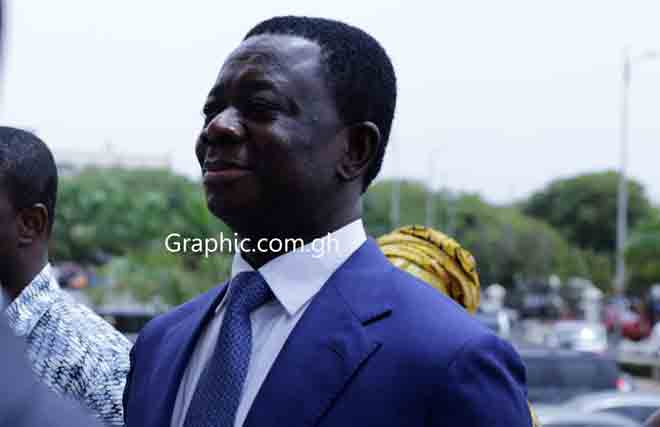
Court orders AG to furnish Dr Opuni with documents
The Criminal High Court in Accra has given the Attorney-General (A-G) seven days to release to the former Chief Executive of the Ghana Cocoa Board (COCOBOD), Dr Stephen Kwabena Opuni, all necessary documents she intends to rely on to prosecute him.
The court, however, said the disclosure, which will allow the defence team enough time to study and put up a defence, must be based on relevance, admissibility and national security.
In the view of the court, the release of the documents would ensure fair and expeditious trial from July 4, 2018, warning that unnecessary adjournments would not be countenanced.
Reading a unanimous ruling by the Supreme Court on a similar case in which the defence team of five persons charged with criminal offences requested the apex court to order the A-G to release documents it planned to rely on to prosecute their clients, the court said the Supreme Court judgement was binding on all lower courts, including the High courts.
To forestall any delay during the trial, the court, presided over by Mr Justice Clemence Honyenuga, advised the defence team to make its telephone numbers available to the Registrar of the High Court, “so that as soon as the DPP files the documents you can be called”.
‘We’ll abide by ruling’
The Director of Public Prosecutions (DPP), Mrs Yvonne Attakorah Obuobi, assured the court that the A-G would abide by the seven-day ruling of the court.
She told the court that although some of the documents in the A-G’s custody were bulky, they would be photocopied and made available to the Registrar of the High Court within the seven days given the A-G.
Application
At a previous sitting, lawyers for Dr Opuni, who is standing trial for allegedly causing financial loss of GH¢271.3 million to the state in a series of fertiliser deals, filed a motion asking the court to order the A-G to make available to them all documents she intended to use to prosecute their client.
The motion was premised on Article 19 Clause 2 (e) and (g) of the 1992 Constitution, which relates to fair trials.
Dr Opuni’s legal team is seeking access to about 30 documents, including all prosecution witness statements, witness statements of their client and the second accused person, Seidu Agongo, as well as all documents relating to COCOBOD fertiliser contracts between 2008 and March 2018.
They also want all letters written by their client to the Public Procurement Authority (PPA) during his tenure as the CEO of the COCOBOD in relation to permission to sole-source contracts for all fertiliser and all letters written by the PPA in connection with the Lithovit Follar Fertiliser (LFF).
Referral to SC
The court maintained that since the application was related to a constitutional interpretation of Article 19 Clause 2 (e) and (g) of the 1992 Constitution, it could only give its ruling after the Supreme Court had given its interpretation on the matter.
It, therefore, declined to rule on the motion by Dr Opuni’s lawyers for the documents, saying any ruling on the issue would “undermine the integrity and authority of the Supreme Court”.
“For consistency and fairness to prevail, the ruling must be adjourned in order to abide by the decision of the Supreme Court. Indeed, a decision of the Supreme Court will be binding on all lower courts,” he said.
It referred to the National Communications Authority (NCA) case in which the lawyers of five accused persons argued that per Article 19 Clause 2 (e) and (g), their clients were entitled to all the prosecution documents in relation to the case.
SC unanimous ruling
On June 7, 2018, the Supreme Court, in a unanimous decision, granted persons charged with criminal offences access to prosecution documents in relation to their cases.
The seven-member panel declared that the accused persons, irrespective of the offences levelled against them, must be given prosecution documents to aid their defence.
What can be disclosed?
In its decision, the court was of the view that “adequate time and facilities”, as captured in Article 19 (2) (e), meant that accused persons must be afforded all the means necessary to properly defend themselves.
In view of that, it stated that the prosecution must release all documents that would assist accused persons in the preparation of their defence.
Accordingly, it held that accused persons must be given access to all statements made to the police by persons who would be used as prosecution witnesses and even those who would not be used as witnesses by the prosecution.
Again, the court ordered that accused persons must be provided with all the exhibits and documents which the prosecution would tender as evidence.
